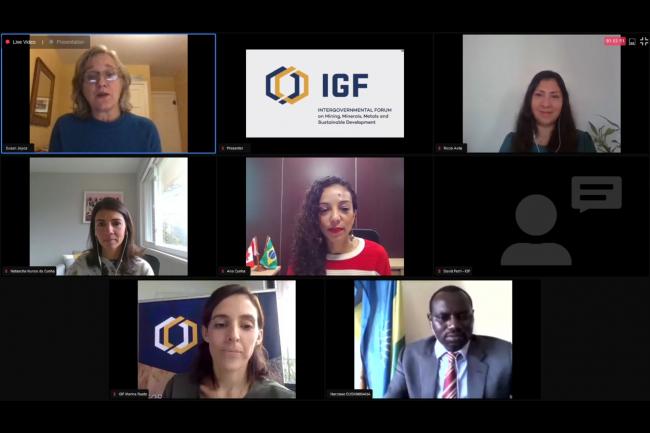On the third and final day of the AGM, participants discussed community engagement, gender equality, environmental and social impact assessments (ESIA), and technological innovation in the time of COVID-19.
Panelists reflected that mining communities have indeed suffered during the pandemic, due to job losses, economic and food insecurity, border closures and travel restrictions, and disruptions to supply chains. Several companies and NGOs highlighted their actions to assess the extent of difficulties in such communities, and provide practical support. They also stressed that efforts to boost economies in the wake of the crisis should protect human rights, protect the environment, and generate equal opportunities for both women and men. They noted that more resilient communities will benefit everyone.
Regarding relationships between companies and communities, Natascha Nunes da Cunha, Inter-American Development Bank (IADB), remarked, “It’s not that you ask, I give, and let’s move on—the challenge is to find more effective ways of collaboration between different stakeholders.”
Participants heard about experiences from Cambodia, Canada, and Colombia in conducting gender impact assessments and developing gender-inclusive policies. Speakers noted that gender is one of many interacting factors in structural inequalities. Other factors could include characteristics such as ethnicity and indigenous status. Speakers presented innovations in technology and practice, such as the use of mobile apps in collating gender-specific information among hill tribes in Cambodia, and rapidly reporting back to local communities. They stressed the value of gender impact assessments as a basis for determining how new mining projects might exacerbate, or alleviate, existing patterns of inequality.
The session on rethinking ESIA at the early phase of mine development addressed what role such assessments can play for responsible mining and the challenges faced. Participants heard how ESIAs are becoming increasingly complex, as the mining sector deals with increasingly complex situations. They were provided with an overview of IISD's IGF Guidance for Governments: Improving legal frameworks for environmental and social impact assessment and management, which summarizes international best practices in legal frameworks for ESIAs and includes tools to help evaluate and improve current legal frameworks. Participants then heard practical examples from the field on the strategic use of ESIAs.
The last dialogue of the day considered technological innovation in the post-COVID-19 era. Industry leaders considered that robotics and digitization are already influencing the way that mines work. They foreshadowed the need for workers to be skilled in new ways, in areas such as cybersecurity, data management, automation, and servicing of equipment. They underscored that, by reducing the need for heavy physical labor, technology will introduce more gender-neutral work roles—for example, in operating control rooms and managing automated processes.
In closing, Greg Radford, Director, IGF Secretariat, warmly thanked all who had participated, and noted that the online format of the meeting had enabled much larger numbers than usual to attend. The 2020 AGM had drew 1,800 people from 110 different countries, one-third of them from governments. Carolina Rojas Hayes, Deputy Minister of Mines, Colombia, emphasized the close collaboration among the mining sector, government authorities and local communities to help adapt to changes as a result of COVID-19. Mark Cutifani, CEO, Anglo American, anticipated a future post-COVID-19 in which people will work together to ensure that “mining works for everyone.”



